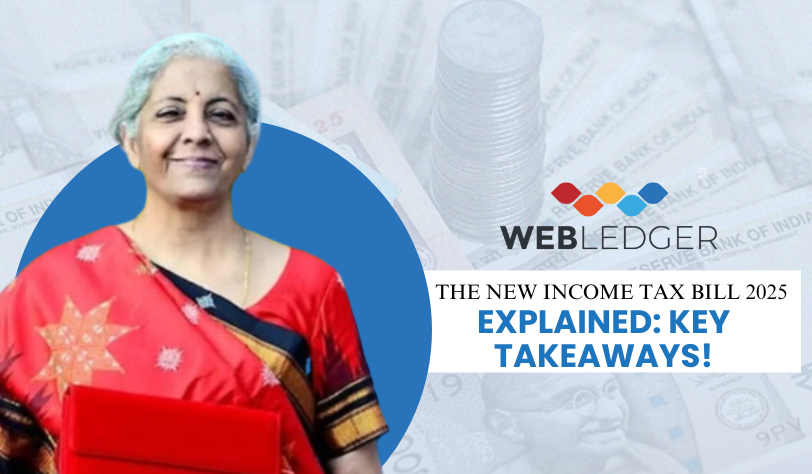
The New Income Tax Bill 2025 Explained: Key Takeaways!
The Indian Union Finance Minister Nirmala Sitharaman introduced a new income tax bill in the Parliament, i.e. in the Lok Sabha on February 13, 2025, around 2 pm. This bill aims to update tax laws to make it easier for people to follow the rules and lower the burden on taxpayers against the original Income Tax Act of 1961. This new income tax bill 2025 was introduced shortly after the Union Budget 2025 was released in India on February 1, 2025. The bill will soon go to a committee for review and approval. The committee will discuss it, make suggestions, and consider changes before the bill can become law. This new income tax bill will be effective from April 1, 2026, if approved.
Key takeaways from the new Income Tax Bill 2025 are as follows:
1) The New Income Tax Bill 2025 was tabled in Lok Sabha on February 13, 2025.
2) The original Income Tax Act of 1961 includes 819 sections. The number of sections is reduced to 536 in the new Income Tax Bill 2025, i.e., reduced by 53%, and the sections are more straightforward.
3) The term “tax year” is introduced. The term ‘tax year’ will replace ‘previous year’ to simplify understanding the new bill. It aligns with global practices, as many countries use this term for the taxation period. Key principles include: i) ‘Tax Year’: This term will apply to all transactions and income during that period. ii) ‘Financial Year’: For the sake of compliance deadlines and matters concerning procedures.
Webledger
Please enter the OTP below to proceed.
4) The new bill is easier to understand because it uses more straightforward language and clearly outlines sections for different situations. Information is often shown in tables, like the TDS (Tax Deducted at Source) rules. Complex rules, such as section 10, have been moved to Schedules and presented in tables. This change has reduced the size of the new Bill by about half and made it more user-friendly.
5) The Union Finance Ministry has removed over 1,200 provisos and more than 900 explanations. Their simpler versions are now included as sub-sections or clauses. The ministry will provide specific details and procedural aspects through Rules whenever possible.
6) Under section 515 (3) (b), the term “accountant” means a “Chartered Accountant” who holds a valid certificate of practice. Only chartered accountants (CAs) will continue to conduct tax audits.
7) The tax audit exemption under section 44 AB (a) was proposed to be revised. The existing limit is Rs 1 crore, and the proposed limit is Rs 5 crore in the new income tax bill 2025 for businesses (normal case).
For businesses doing cash transactions, the current turnover limit for businesses to be exempt from a tax audit is Rs 10 crore if they have less than 5% cash transactions (Section 44AB(a)). The proposed new limit is Rs 25 crore.
Further, the current turnover limit for tax audit exemption under section 44AB(b) for professionals is Rs 50 lakhs, which the new income tax bill 2025 proposes to increase to Rs 1 crore.
8) The business turnover limit under Section 44AD for presumptive taxation was proposed to be increased from Rs 2 crore to Rs 3 crore, with presumptive income remaining 8% of turnover (6% for digital receipts). The turnover limit for professionals under section 44ADA has increased from Rs 50 lakh to Rs 1 crore, with presumptive income remaining at 50% of turnover.
9) The due dates for filing tax audits (Form 3CD) have been proposed to be extended from September 30 to October 31. Further, the due date for filing ITRs for tax audits was proposed to be extended to November 30 from October 31.
10) The new Income Tax Bill 2025 introduces a faceless e-assessment and auto-verification system for tax audit reports, replacing manual verification. It will employ AI-based risk analysis to identify high-risk cases for closer examination, leading to quicker report processing. Auto-verification aims to minimise errors and delays, improving the overall compliance process.
11) The penalty for failing to file a tax audit report (Form 3CD) is 0.5% of turnover, with a maximum limit of Rs 1.5 lakh. Enforcement is stricter now, using faceless assessments to identify non-compliance. The Income Tax Bill 2025 proposes increased penalties for incorrect or misleading tax audit declarations, with AI-based detection leading to autogenerated penalty notices.
12) The Income Tax Bill 2025 introduces enhanced disclosure requirements for international transactions in the context of transfer pricing tax audits. To ensure compliance with international taxation norms, it proposes stricter arm’s length pricing rules and documentation requirements for multinational companies. Financial companies working in the International Financial Services Centre (IFSC) located in GIFT City are proposed to be exempt from tax audits to encourage India’s position as a worldwide financial centre.
To learn more about the new income tax bill for 2025, you may visit the incometaxindia.gov.in website.
Conclusion
Apart from reducing the sections and simplifying the content of the act, the Income Tax Bill 2025 introduces significant changes to tax audit provisions. These changes aim to streamline compliance and promote a more transparent and efficient tax audit system. They also aim to reduce compliance burdens, encourage digital transactions, and simplify audit applicability for businesses and professionals.




